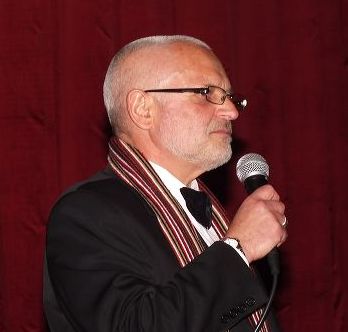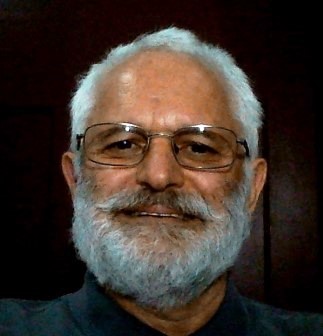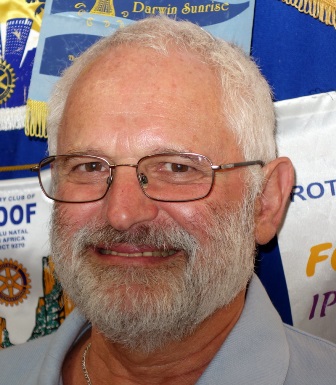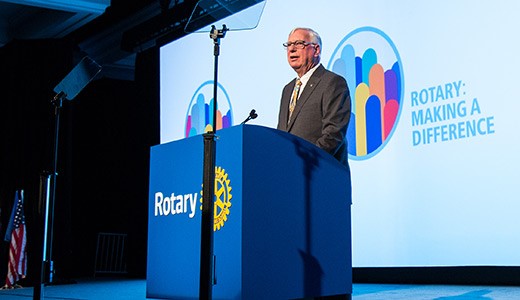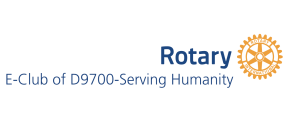Outside the United Nations building in midtown Manhattan stands an imposing sculpture of a man wielding a sword in one hand and raising a hammer with the other. It reflects a shared goal that Rotary and the United Nations celebrated at the organizations’ annual meeting on Saturday, 12 November: to use our strengths and tools to build a more peaceful and just world.
The theme of this year’s Rotary Day at the United Nations, “Responsible Business, Resilient Societies,” emphasizes Rotary’s role as a global network of business leaders using the tools of their trades to build stronger, more prosperous communities.
In his introductory remarks, Rotary International President John F. Germ drew the crowd’s attention to the statue, “Let Us Beat Our Swords Into Ploughshares,” as he set the tone for the day, which included breakout sessions and keynote addresses on aspects of responsible business, or the philosophy that for-profit enterprise can contribute to positive social and economic development.
“Here is where the UN and Rotary International are working side by side, equipping communities with the tools they need, and empowering them with the will to use those tools far and wide,” he said.
Per Saxegaard, founder and chairman of the Oslo-based Business for Peace Foundation, gave a keynote address on the complex relationship between business and broader society, marked by both tension and opportunity. Despite the perception that profit alone motivates enterprise, he says, commercial success and social progress are closely intertwined.
“Societal needs define markets,” he said. “I have met many entrepreneurs in my career, and they all have one thing in common: They see a problem, and they say ‘I can fix that, and I can do it cheaper and better.’ That is the engine of innovation in business. We need that energy to solve the problems at hand,” such as hunger or illiteracy. He pointed to the Sustainable Development Goals, the UN’s ambitious roadmap for eliminating poverty by 2030 and highlighted the opportunity for businesses to help achieve them.
Other speakers included UN Under Secretary-General and High Representative for Disarmament Affairs Kim Won-soo and UNICEF polio chief Reza Houssaini, who provided an update on the polio eradication campaign.
John Hewko, general secretary of Rotary International, introduced eight Rotary Responsible Business honorees, six individuals and two corporate partners whose inclusive business practices are bringing employment, mentoring, education, and innovation to their communities.
The individuals honored were:
- Juan Silva Beauperthuy, Rotary Club of Chacao, Venezuela: For 25 years, Beauperthuy has helped keep disadvantaged youths on the right track through Queremos Graduarnos, an education program focused on mentoring and skill development, with support from his engineering firm. Today, the program serves more than 700 students in 18 schools.
- Jean-Paul Faure, Rotary Club of Cagnes-Grimaldi, France: To encourage young professionals and provide promising new businesses with training and funding, Faure launched a business contest called Le Trophée du Rotary. Now in its seventh year, the program has drawn support from a major bank and has kept past participants involved as mentors.
- Suresh Goklaney, Rotary Club of Bombay, India: Goklaney, executive vice chair of a large manufacturer of UV water purification systems, has led efforts to provide clean water in rural villages and impoverished urban areas throughout India. The project has also established centers where local women can sell clean water to generate income.
- Annemarie Mostert, Rotary Club of Southern Africa, South Africa: Mostert formed Sesego Cares, a Johannesburg-based nonprofit, in 2005 to offer education and job training, and to teach entrepreneurship and leadership development to women and children. She also worked with TOMS Shoes to provide 1.3 million pairs of its shoes to the country’s poor.
- Stephanie Woollard, Rotary Club of Melbourne, Victoria, Australia: After meeting seven illiterate craftspeople during a visit to Nepal, Woollard founded Seven Women to help Nepalese women make products to sell abroad. The program, which has trained and employed more than 1,000 women in the past decade, also teaches basic bookkeeping and computer skills.
- Larry Wright, Rotary Club of Taylor, Michigan, USA: A master gardener, Wright started his landscaping business with a bank loan in the 1970s. In 2013, he led an effort to adapt a microfinance model that had succeeded abroad to offer microloans, business classes, and mentorship to entrepreneurs in Detroit.
The business partners honored were:
- Coca-Cola Pakistan has supported the Rotary Pakistan National PolioPlus Charitable Trust since 2010 to promote polio prevention and awareness, particularly through publicity and projects to provide clean water, in one of the few countries where polio remains endemic.
- Mercantil Banco Universal supports a project that has trained 6,000 students in 40 universities across Venezuela in social responsibility and leadership, with the goal of encouraging students to use their academic knowledge to respond to the challenges of underserved communities.
In the afternoon, Rotary member Devin Thorpe spoke about the intersection of profit and purpose. Infusing a corporate program with a sense of social purpose pays off, he says, because it breeds loyalty and satisfaction among both customers and employees.
“When a purpose program is profitable, there is no limit to the good that can come from it,” he said. “Corporations are made up of people. We in this room bear the responsibility to shape corporate behavior, it is up to each one of us.”
Watch video coverage of the event on UN Web TV.

